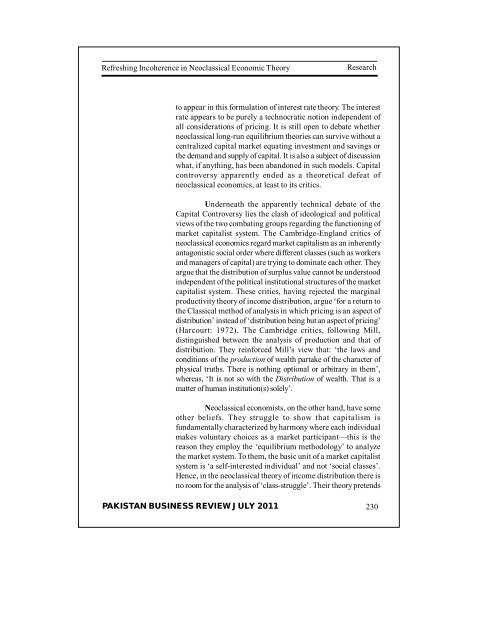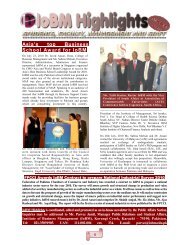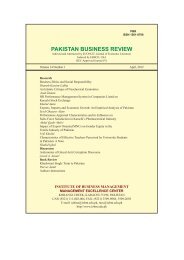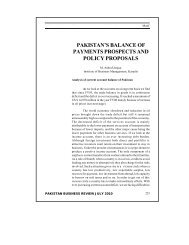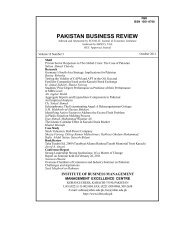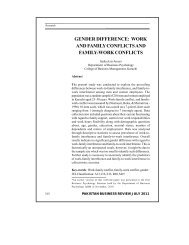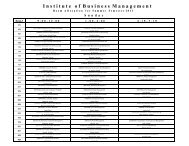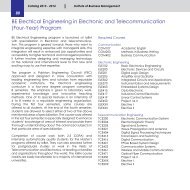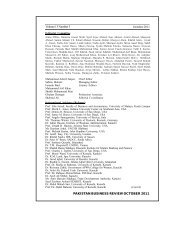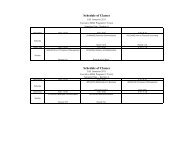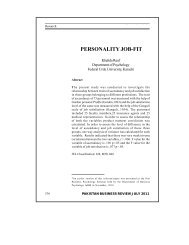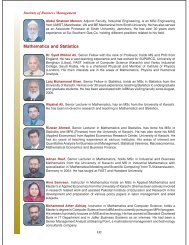PAKISTAN BUSINESS REVIEW - Institute of Business Management
PAKISTAN BUSINESS REVIEW - Institute of Business Management
PAKISTAN BUSINESS REVIEW - Institute of Business Management
You also want an ePaper? Increase the reach of your titles
YUMPU automatically turns print PDFs into web optimized ePapers that Google loves.
Refreshing Incoherence in Neoclassical Economic Theory<br />
Research<br />
to appear in this formulation <strong>of</strong> interest rate theory. The interest<br />
rate appears to be purely a technocratic notion independent <strong>of</strong><br />
all considerations <strong>of</strong> pricing. It is still open to debate whether<br />
neoclassical long-run equilibrium theories can survive without a<br />
centralized capital market equating investment and savings or<br />
the demand and supply <strong>of</strong> capital. It is also a subject <strong>of</strong> discussion<br />
what, if anything, has been abandoned in such models. Capital<br />
controversy apparently ended as a theoretical defeat <strong>of</strong><br />
neoclassical economics, at least to its critics.<br />
Underneath the apparently technical debate <strong>of</strong> the<br />
Capital Controversy lies the clash <strong>of</strong> ideological and political<br />
views <strong>of</strong> the two combating groups regarding the functioning <strong>of</strong><br />
market capitalist system. The Cambridge-England critics <strong>of</strong><br />
neoclassical economics regard market capitalism as an inherently<br />
antagonistic social order where different classes (such as workers<br />
and managers <strong>of</strong> capital) are trying to dominate each other. They<br />
argue that the distribution <strong>of</strong> surplus value cannot be understood<br />
independent <strong>of</strong> the political institutional structures <strong>of</strong> the market<br />
capitalist system. These critics, having rejected the marginal<br />
productivity theory <strong>of</strong> income distribution, argue ‘for a return to<br />
the Classical method <strong>of</strong> analysis in which pricing is an aspect <strong>of</strong><br />
distribution’ instead <strong>of</strong> ‘distribution being but an aspect <strong>of</strong> pricing’<br />
(Harcourt: 1972). The Cambridge critics, following Mill,<br />
distinguished between the analysis <strong>of</strong> production and that <strong>of</strong><br />
distribution. They reinforced Mill’s view that: ‘the laws and<br />
conditions <strong>of</strong> the production <strong>of</strong> wealth partake <strong>of</strong> the character <strong>of</strong><br />
physical truths. There is nothing optional or arbitrary in them’,<br />
whereas, ‘It is not so with the Distribution <strong>of</strong> wealth. That is a<br />
matter <strong>of</strong> human institution(s) solely’.<br />
Neoclassical economists, on the other hand, have some<br />
other beliefs. They struggle to show that capitalism is<br />
fundamentally characterized by harmony where each individual<br />
makes voluntary choices as a market participant—this is the<br />
reason they employ the ‘equilibrium methodology’ to analyze<br />
the market system. To them, the basic unit <strong>of</strong> a market capitalist<br />
system is ‘a self-interested individual’ and not ‘social classes’.<br />
Hence, in the neoclassical theory <strong>of</strong> income distribution there is<br />
no room for the analysis <strong>of</strong> ‘class-struggle’. Their theory pretends<br />
<strong>PAKISTAN</strong> <strong>BUSINESS</strong> <strong>REVIEW</strong> JULY 2011<br />
230


